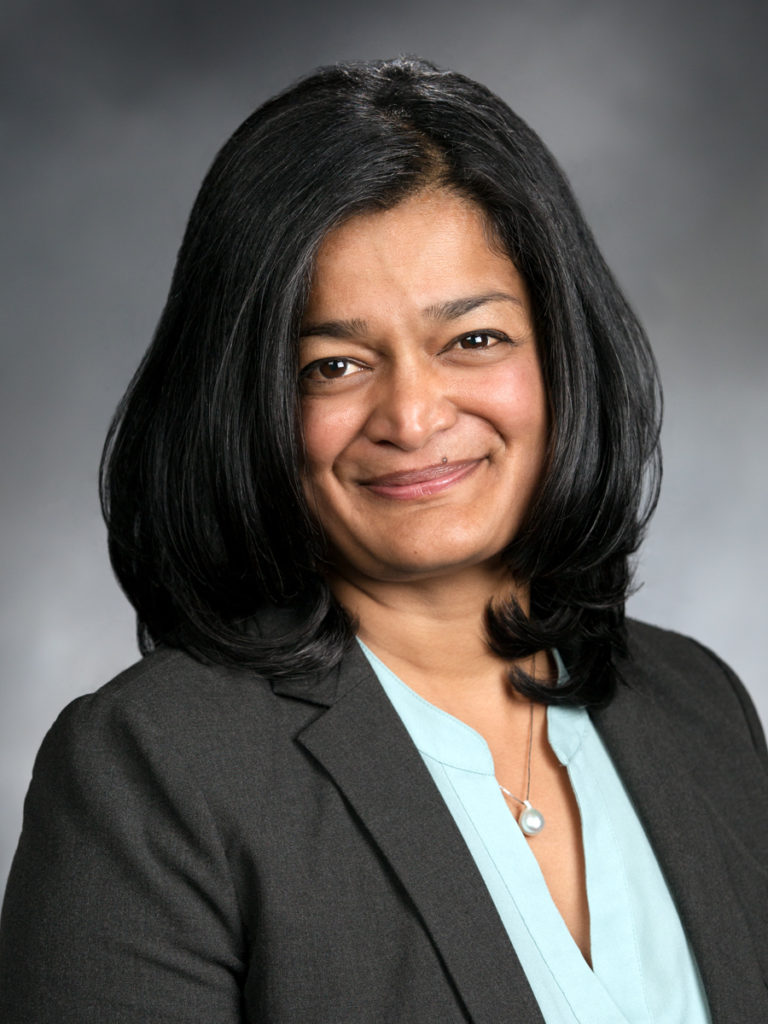Senator Pramila Jayapal is serving her first term in the Washington State Senate and represents the 37th Legislative District. Senator Jayapal has spent the last twenty years working both internationally and domestically as a leading national advocate for women’s, immigrant’s, civil and human rights. She led one of the largest voter registration efforts in Washington state, helping over 23,000 new Americans to register to vote.
Tell us more about yourself and what you do? What’s a day like in the life of Senator Jayapal?
I am an immigrant to the United States and came to the U.S. when I was sixteen. My parents used all the money they had to send me here. For the last 20 years I have been working on social justice issues as an activist and advocate on the outside, so being in government is now being on the inside. As advocates, we were always trying to get legislators to do the things that we wanted. After decades of that, I decided to run because I felt like it was time for us to be on this side.
A day in the life of a senator is really hectic, it has no breaks. My average day starts at about 7am in the morning and that includes on certain weeks driving down to Olympia, which is about an hour away from where I live. Depending on the week, I drive down every morning and go back every night.
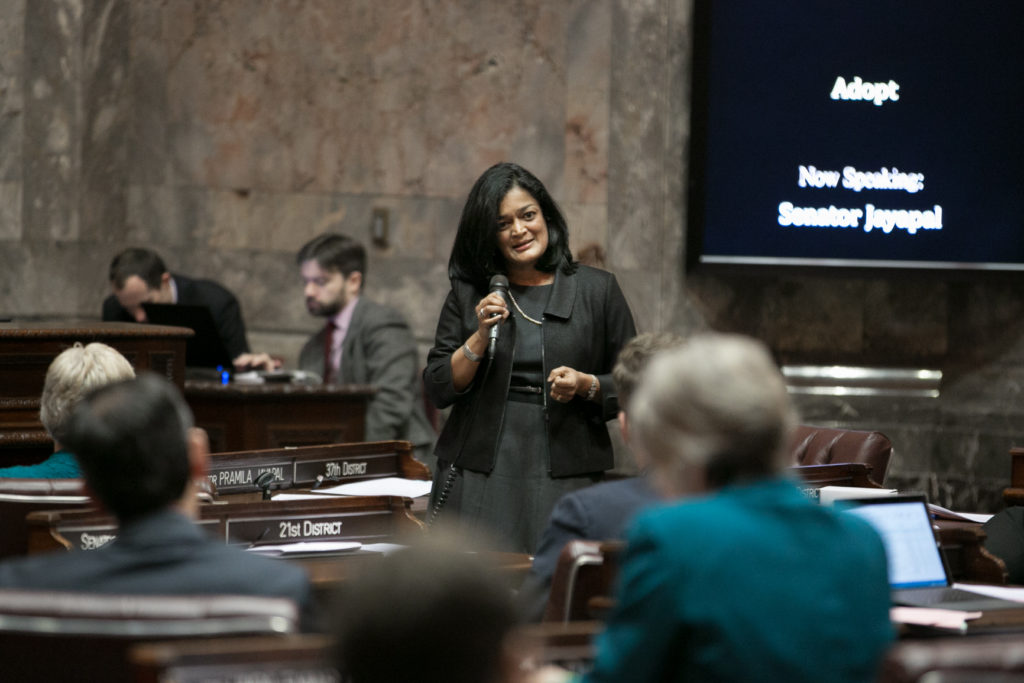 My time is split between being on the floor and taking votes on the floor on bills as they are coming through the process. I serve on both the healthcare and the transportation committee, both of which are huge areas of content. I’m also the ranking member of a committee called government accountability and reform. I spend a significant amount of time meeting with constituents and others who want to meet. Those meetings are generally 10-15 minutes at the most, and I try to absorb as much content as possible.
My time is split between being on the floor and taking votes on the floor on bills as they are coming through the process. I serve on both the healthcare and the transportation committee, both of which are huge areas of content. I’m also the ranking member of a committee called government accountability and reform. I spend a significant amount of time meeting with constituents and others who want to meet. Those meetings are generally 10-15 minutes at the most, and I try to absorb as much content as possible.
There aren’t many people who look like me or come from my background in the legislature. It’s a very different kind of environment to operate in but it’s also fascinating as there is a lot of content and I am also learning a lot about the process as it is my first time here.
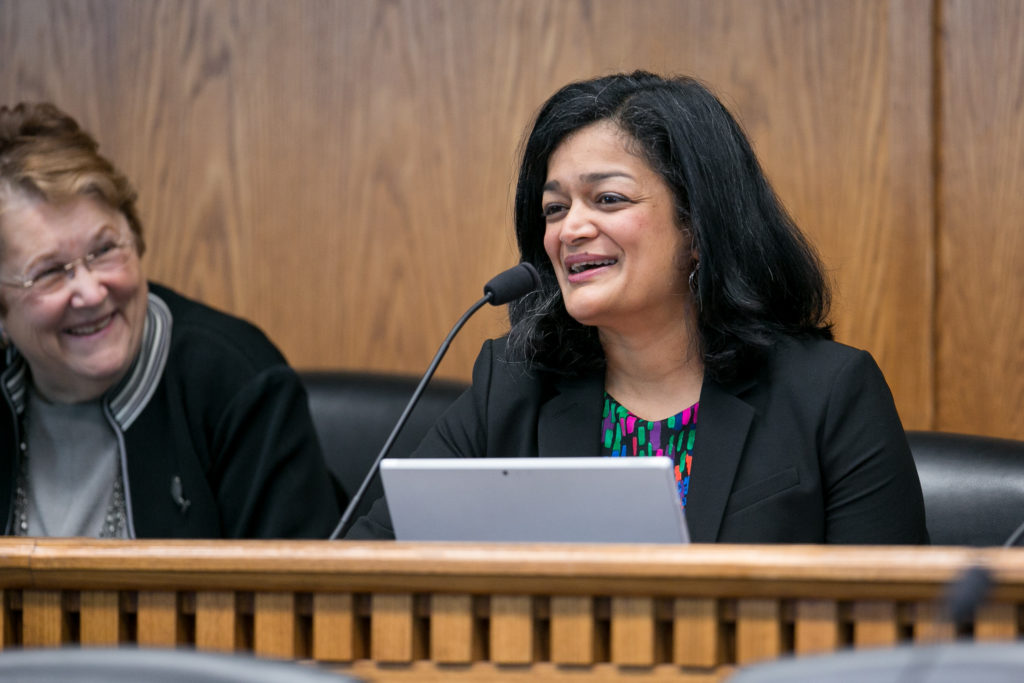
Congratulation on winning Seattle’s 37th District Senate seat. How does a 16-year-old girl from India become the only Indian American woman to get elected to the Washington State Legislature and be the only woman of color in the State Senate now? Tell us more about your political journey. What major challenges did you face and how did you overcome them?
I never imagined that I would be here. Coming here at the age of sixteen, I think my father wanted me to be a CEO. I did work for the private sector for a little while and then left the private sector and devoted my life to social justice issues, worked domestically, internationally and in India on women’s issues.
I think the appeal of being in the legislature is really that we need to have more diverse representation of issues and constituencies in elected government. In the past, I have worked on changing policy by engaging from the outside, trying to fix the wrong from outside and doing that at a very integrated level, rather than from a single issue focus. I’ve worked on women’s issues, I’ve been an advocate of public health, I’ve been an advocate around economic justice issues and of course racial justice issues and human rights issues. I really feel deeply that all of these things are connected. And in looking at the systems that prevent change from happening, so much of it is that we invest power with the elected government. That’s the beauty and sometimes the challenge of democracy. People are elected to make policy decisions, which affect so many people’s lives. But the more I tried to make change happen–and we did make some incredible things happen–the more I saw that people don’t value people of color and low income people enough because they are not voting and they don’t make enormous political contributions as do other sectors and communities. They are perceived as not having political power. Simply put, we need more champions within the government, people who can represent the voices of working families, and also can bring understanding and consensus from a broad variety of legislators to complex and less understood issues.
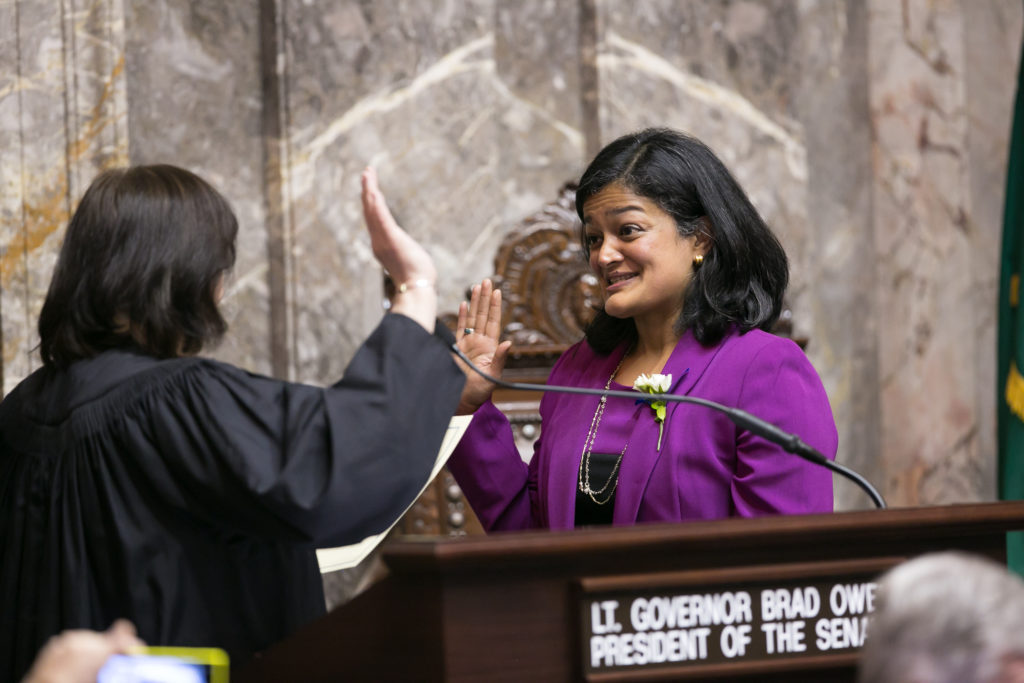 The challenges are, of course, always there. People may want to put you in a box or look at you in a certain way. I’ve had a little bit less of that because my career in organizing has been very powerful. I have a lot of allies and a lot of partners that I worked with. People know what I stand for and so running for election felt like I was running another organizing campaign—and I know how to do that! Because of my previous work, I had a lot of support because I knew a lot of people. Many people who run for first-time office don’t have that kind of support, either in terms of allies or in terms of being able to fundraise sufficiently.
The challenges are, of course, always there. People may want to put you in a box or look at you in a certain way. I’ve had a little bit less of that because my career in organizing has been very powerful. I have a lot of allies and a lot of partners that I worked with. People know what I stand for and so running for election felt like I was running another organizing campaign—and I know how to do that! Because of my previous work, I had a lot of support because I knew a lot of people. Many people who run for first-time office don’t have that kind of support, either in terms of allies or in terms of being able to fundraise sufficiently.
The biggest challenge is you go into an organized bureaucracy that has been around for a long time. It’s very hierarchical; you are a brand-new senator, so you don’t know how the process works. Many of the issues that I have worked on are not generally understood, nor is there deep passion for those issues of from a wide constituency.
You have a BA in English literature from Georgetown University and an MBA from the Kellogg School of Management at Northwestern University. From Investment banking to social justice and now to politics. What (or who) is guiding you and what is your career dream?
My father would love to know that too. I have been guided by the injustice I see in front of me. I really think that’s true. I see something, and it seems crazy that we live in a world that allows that. So, I get drawn in to work on it and I allow that to be my guide. I feel like I’ve had so many friends and allies, supporters, people that I’ve learnt from along the way but my vision is for a different world and that is so deeply embedded in me. It is this vision that guides me. The injustice drives the angry part of me that then wants to get to work actually fixing things and finding solutions. So I think that’s where it really comes from. I don’t have a career dream, in the classic sense, because this isn’t really about me. In all of the work that I’ve done, I’ve been the spark, I’ve been a driver, efforts have been channeled through me for making something happen. But, its not because I’m looking for where I want to go next, it’s because I am looking at how we can create a better world.
People are already saying that you should run for this next or you should run for that; I’ve never been that kind of a person. My career dream is to serve people and create a more just society and at the center of that are women, people of color and low-income people and really fixing things so that they can be supported.
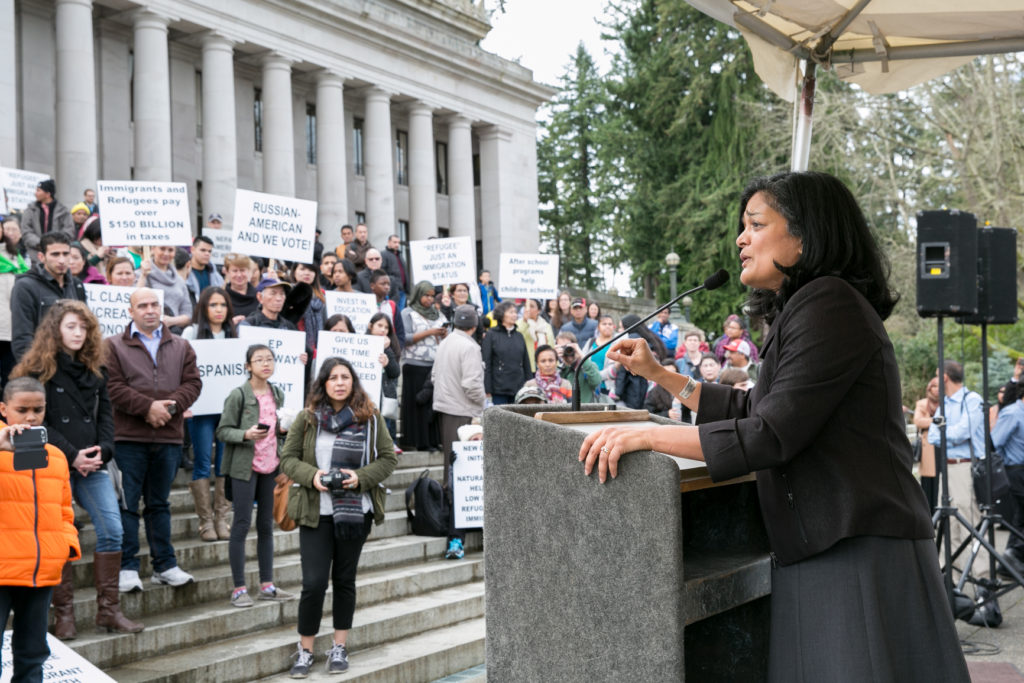
For someone (especially women) aspiring to get into politics, what’s your advice? Where do they start?
I love talking about this. I actually have made it a part of my life, to encourage women along the way because I think that it’s something very specific to us– we need to do it! There aren’t very many of us in these top roles and we need to support each other. My staff is all young women of color and during the campaign I really tried to engage young women. I’m actually speaking tomorrow to a group of 50-70 young women in college and encouraging them to think about elected office.
So my advice really is four things:
1. Believe in yourself and believe you can do it. The most common reason that women don’t run is because nobody asked them. Data shows that a man only has to be asked once to run but women have to be asked 5-10 times to run. So this is a very powerful indication of where we are in society. Women don’t tend to think of themselves as political leaders and if they do think about it they are nervous about it for good reasons. But we know that women can raise money, that they are extremely sympathetic candidates, so it’s really about believing in your self and actually beginning to pursue the relationships.
2. Building relationships and introducing yourself to people long before you ever need them is incredibly important. And I have had the great fortune to build and work on great relationships and partnerships at work for a long time. So when I decided to run for elections, it was easy, not everyone has that. Think about all the relationships and map all the relationship you have if you are thinking about running for office.
3. Don’t be afraid to pick up the phone and call. You have to ask people for money, for help and for support. The worst thing they can say to you is a ‘No’. It’s discouraging if people say no but, my belief is “what’s wrong with them, they are missing out on a good opportunity, lets move on to the next one”. So I think just being resilient goes a long way.
4. The last thing is to call another women. Find other women to be your support network. In spite of having no time at all, I have offered myself – if young women ask me to go speak to them, I do everything I can to do help them. We have to stick together, help each other, mentor each other and guide each other. I’ve had that happen for me and I want to make sure that happens for other people.
You are a strong feminist and a champion of women’s rights. What is your take on the women’s safety problem in India? What according to you are some solutions to this social problem? Where would you start?
There are three sides to this. One is the cultural norms and beliefs, which actually make violence okay, I think that is just completely unacceptable and that has to change. The other is the legal system and rights. And then, I would say, the third is the organizing and I would say there are such incredible groups in India that are doing real organizing around these issues. Young women are going to be key to any solution, so are men. When I read some of the things that politicians say, much less the media, I cannot believe that we are in the 21st century. And that is still the attitude that it’s the woman’s fault if she wears certain clothes, or if she goes out on a bus. These are the deep concepts, cultural values and norms that have to be changed. There has also got to be a complete cracking down on somebody anytime they do say those things, making it completely unacceptable. That’s the organizing part from the outside. I think continuing to really make the connection between violence against women and the breakdown of society is very important as a broad narrative. People think violence against women is a personal issue, a family issue. No, it’s not. It’s a societal issue, but we have to keep making that broad connection. I am of the firm belief that continued community organizing, empowering women to speak up and to challenge the stereotypes and the norms and values all has to be a part of this. In all of my work, one of the things I really have come to see is that I am tired of having women portrayed just as victims. Yes, women are victims, but we are also powerful actors. For a woman to get out of a domestic violence situation means she has to be powerful and resilient. For a woman to hold her family together, even as she is dealing with all these other things, to be working or not to be working, in the home or outside of the home. These are all things that require tremendous resilience, creativity, courage and leadership. In the movement we need to make sure that we are not falling prey to, you know, “Oh we are all victims”. Sure we are victims, but we are also powerful actors and this narrative must be a strong part of how we portray what is happening with women today and the leadership roles that women can and should play.
What is your idea of an empowered woman?
My idea of an empowered woman is a woman who feels that she can be who she is, without the constraints and restrictions of norms and values that are pushed on to her. I really believe that allowing women the freedom to choose the direction of their lives, to have full power over her own body and the choices she makes for her body and for her life, to be able to have the tools that she needs to be successful, this is really what a powerful woman looks like. A powerful woman just needs to speak up and be able to say ‘this is what I want for myself, this is what I need for my body’. We have to provide the support like education and making sure she has access to all of those things, making sure that she is able to assure her own safety. We need to make sure to address the conditions that stop women from seeing themselves as strong, empowered women.
Sayfty’s mission is to Educate, Equip and Empower women so that they can protect themselves against violence. What is your message for our readers related to women’s personal safety and the issue of violence against women?
My message is, we have to continue to stand together because violence in any form is not acceptable. We are the voice that people need to listen to. Women know what they need and society needs to listen to that powerful voice of women. Together, we have to make sure we eradicate violence against women.
Bio
Pramila is serving her first term in the Washington State Senate, representing the 37th Legislative District. Her home of nearly twenty years, the 37th district is one of the most racially and economically diverse districts in Washington state.
Born in India, Pramila came to the U.S. by herself when she was sixteen to attend Georgetown University. She worked on Wall Street as a financial analyst following graduation and then went on to earn a Master of Business Administration from Northwestern University. After working in the medical equipment industry for a year, she decided to leave the private sector and pursue work in the social justice arena.
Pramila has spent the last twenty years working both internationally and domestically as a leading national advocate for women’s, immigrant’s, civil and human rights. She worked on improving access to women’s reproductive and primary health internationally and on increasing access to credit in low-income communities in the U.S. and abroad.
She is the founder and former Executive Director of OneAmerica, Washington state’s largest immigrant advocacy organization, where she led one of the largest voter registration efforts in the state, helping over 23,000 New Americans to register to vote. She also helped organize the coalition that successfully pushed for the passage of the 2014 Washington State Dream Act, which allows access to state higher education financial aid for undocumented young people. She also served as the chair of We Belong Together, a national campaign to bring a strong gender analysis and advocacy to the issue of immigration.
She is the recipient of numerous awards, including the National Organization for Women’s Olga Vives Award – given to a woman who has been a leader nationally on improving the lives of women of color and vulnerable women. In May 2013, Pramila was also recognized as a White House “Champion of Change.”
In addition to her work as an advocate, she is an author of a book and a contributor to numerous publications, including The Nation and Reuters. She lives in Seattle with her son and husband, and has another grown stepson who lives in Colorado.
